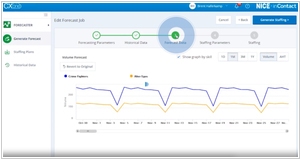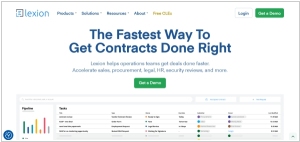Five9 vs NICE CXone
June 13, 2023 | Author: Sandeep Sharma
16
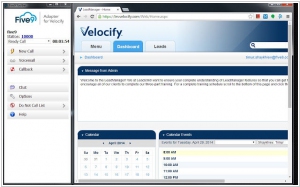
Call center software from Five9 is the leading cloud contact center software solution, bringing the power of the cloud to thousands of customers worldwide. Meet your customers in the channel they prefer. Whether it's the phone, web, chat, email, mobile apps, or social media, Five9 has you covered. An innovative technology layer that we call Five9 Connect powers our multichannel applications, delivering better customer engagements, faster response times and empowered agents.
Five9 and NICE CXone are two prominent cloud contact center solution providers that help organizations deliver exceptional customer experiences. While they share a common goal, there are key differences between the two platforms.
Five9 offers a comprehensive suite of contact center capabilities, including omnichannel routing, workforce optimization, reporting and analytics, and integrations with CRM systems. Their platform is known for its flexibility and scalability, allowing organizations to tailor their contact center operations to their specific needs. Five9's focus on providing a user-friendly interface and intuitive tools makes it an attractive choice for organizations seeking an easy-to-use solution.
NICE CXone, on the other hand, offers a unified and integrated contact center platform that combines omnichannel routing, workforce engagement, analytics, and automation capabilities. CXone provides a holistic view of customer interactions, enabling organizations to deliver personalized experiences and optimize agent performance. With its advanced analytics and AI-driven insights, CXone empowers organizations to make data-driven decisions and continuously improve their customer service operations.
The main difference between Five9 and NICE CXone lies in their approach to contact center management and the depth of their offerings. Five9's strength lies in its flexibility and ease of use, making it suitable for organizations of varying sizes and complexity. NICE CXone, on the other hand, excels in providing a comprehensive and integrated platform that empowers organizations to deliver exceptional customer experiences across multiple channels.
See also: Top 10 Self-Service software
Five9 offers a comprehensive suite of contact center capabilities, including omnichannel routing, workforce optimization, reporting and analytics, and integrations with CRM systems. Their platform is known for its flexibility and scalability, allowing organizations to tailor their contact center operations to their specific needs. Five9's focus on providing a user-friendly interface and intuitive tools makes it an attractive choice for organizations seeking an easy-to-use solution.
NICE CXone, on the other hand, offers a unified and integrated contact center platform that combines omnichannel routing, workforce engagement, analytics, and automation capabilities. CXone provides a holistic view of customer interactions, enabling organizations to deliver personalized experiences and optimize agent performance. With its advanced analytics and AI-driven insights, CXone empowers organizations to make data-driven decisions and continuously improve their customer service operations.
The main difference between Five9 and NICE CXone lies in their approach to contact center management and the depth of their offerings. Five9's strength lies in its flexibility and ease of use, making it suitable for organizations of varying sizes and complexity. NICE CXone, on the other hand, excels in providing a comprehensive and integrated platform that empowers organizations to deliver exceptional customer experiences across multiple channels.
See also: Top 10 Self-Service software
Five9 vs NICE CXone in our news:
2021. Zoom, Five9 Scrap $14.7 Billion Deal as Investors Vote No
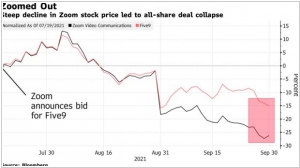
Zoom Video Communications Inc. and Five9 Inc. have terminated their $14.7 billion merger agreement due to a significant drop in Zoom's share price, resulting in a nearly one-third reduction in the deal's value. As a result, shareholders of Five9 rejected the offer. Zoom had intended to acquire Five9, a provider of call-center software, to enhance its widely used videoconferencing application in the face of intensifying competition. Headquartered in San Ramon, California, Five9 develops cloud-based software that utilizes artificial intelligence to assist companies in addressing customer inquiries and engaging with them irrespective of language, location, or device. According to its website, Five9 serves notable brands such as Under Armour, Citrix, Athena Health, and Lululemon.
2021. Zoom buys cloud call center firm Five9 for $14.7B
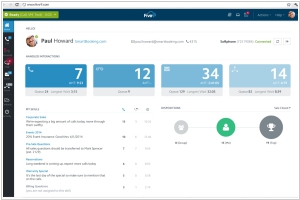
Zoom has reached an agreement to purchase cloud call centre service provider Five9 for approximately $14.7 billion. This proposed acquisition is part of Zoom's ongoing efforts to expand its range of offerings. Over the past year, the video conferencing software has introduced various office collaboration products, a cloud phone system, and an all-in-one home communications appliance. By acquiring Five9, which serves more than 2,000 customers worldwide, including Citrix and Under Armour, and handles over 7 billion minutes of calls annually, Zoom aims to enter the contact center market valued at around "$24 billion."
2021. NICE acquires smart digital self-service platform MindTouch
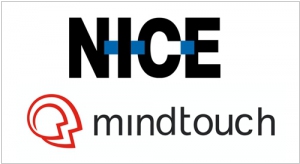
NICE, the provider of the CCaaS platform CXone, has completed the acquisition of San Diego-based knowledge management software company, MindTouch. MindTouch, established in 2005, initially relied on funding from its founders until 2016 when it secured $12 million in a Series A funding round. The company positioned itself as a provider of an AI-powered, enterprise-grade knowledge management (KM) platform tailored for mid-size to large organizations, aiming to enhance customer lifetime value. Their solutions encompass KM for customer self-service, agent assistance, and departmental knowledge. With over 100 employees and more than 300 customers worldwide, including notable brands like 8x8, Cisco, Land Rover, Samsung, Verizon, and Whirlpool, MindTouch has made its mark in the industry. Additionally, MindTouch's technology is integrated into SAP Service Cloud as SAP Knowledge Central, extending its reach even further.
2016. Social knowledge base MindTouch gets $12 Million
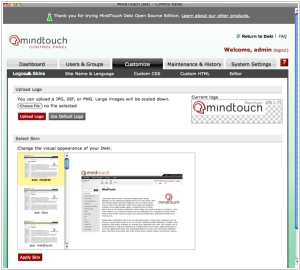
MindTouch, a cloud service that assists customers in locating answers to product-related queries by utilizing existing documentation, training materials, and customer service documents, has announced $12 million in funding following several years of bootstrapping. Their approach involves taking a company's existing content and making it accessible online for customers to utilize. This is achieved by breaking down the content into smaller sections and extracting metadata to enable online searchability. Furthermore, MindTouch employs machine learning techniques to organize logical learning paths through the materials. As a result, customers can easily search for and locate the information they require without the need to contact customer service.
2009. MindTouch - Anti Social Software

(Aaron Fulkerson, MindTouch CEO) ***
2009. MindTouch will provide collaborative video feature
MindTouch, the open-source enterprise wiki solution, has joined forces with Kaltura to introduce comprehensive collaborative video capabilities to the enterprise. This partnership allows MindTouch customers to collaboratively edit, publish, and distribute videos both internally and externally, while maintaining a detailed revision history. While many top-tier wikis and intranets already support easy video embedding, none of them provide significant video editing capabilities, especially in a transparent and collaborative manner. Kaltura stands out as the pioneer in delivering an open-source collaborative video solution, and MindTouch will become the first enterprise platform to integrate and host Kaltura's innovative technology.
2009. MindTouch announced Desktop Suite
MindTouch, the collaborative wiki platform for enterprises, has unveiled its Desktop Suite, a comprehensive set of tools designed to transform Windows documents and files into web-based, searchable, editable, and shareable resources. With one-click publishing from any application, improved drag and drop capabilities, and rapid content indexing, the suite offers enhanced functionality and convenience. It consists of three key components: Aurelia Reporter enables the publishing and sharing of versioned documents, Desktop Connector allows seamless file and directory transfer into the MindTouch environment, and Microsoft Word and Outlook Connectors enable effortless publishing of documents, threaded conversations, and attachments. These tools empower users to collaborate effectively through web browsers, eliminating the need for additional software installations.
2009. MindTouch upgrades its Wiki Platform
MindTouch has unveiled an updated version of its enterprise-focused, open-source wiki-collaboration platform. This platform serves as a connection hub, enabling teams to integrate enterprise systems, web services, and Web 2.0 applications while maintaining IT governance. The latest release introduces enhanced capabilities for developers to create advanced and feature-rich internet applications by combining MindTouch's DekiScript (a scripting language) and Javascript using the JEM (Javascript with events and messages) technology. This advancement empowers developers to build more intricate and innovative applications. The software holds great potential for businesses seeking seamless collaboration between content and IT teams across a web-based platform. It's worth noting that MindTouch offers a free open-source software core and provides premium services starting at $2,000.
2008. MindTouch Releases MindTouch Deki "Kilen Woods"
MindTouch Deki, a smart wiki platform, has announced its latest release called Kilen Woods, which represents a significant transformation for the company. Co-founder Aaron Fulkerson refers to Deki as the "connecting tissue" between applications, essentially a mashup environment that facilitates collaboration and integration among various software. This release introduces a library of connectors to familiar applications and databases like SugarCRM, Salesforce.com, LinkedIn, MySQL, Microsoft SQL Server, and more. Fulkerson highlights that Deki offers over 100 web services for creating workflows and mashups in the enterprise, with customization accessible to business process professionals rather than requiring intensive IT resources. MindTouch Deki is experiencing impressive traction, with 3,000 daily downloads of the free and open-source product, serving both free and paid customers. Fulkerson's passion and understanding of the need for rapid mashups and integrations are evident in the product, which goes beyond traditional wikis. It demonstrates the potential for breaking down information silos and incorporating data into lightweight applications that address complex supply chain challenges. The emergence of adapters for SAP and Oracle Applications could unlock new possibilities for breaking down departmental and cross-business boundaries.
2006. Wiki start-up MindTouch taps open source to lure new users
MindTouch, a start-up specializing in wiki software, has decided to release two of its products as open source to increase developer familiarity with their commercial offerings. The company introduced an open-source project called MindTouch Dream, which enables the development of distributed web applications using Microsoft .Net tools. Additionally, they plan to release Deki, their wiki-based document-sharing software, under an open-source license. MindTouch aims to present both projects at the O'Reilly Open Source Convention. While their primary business involves selling a wiki appliance to small and medium-sized companies, the release of Deki as an open-source product without the server will allow users to experience MindTouch's capabilities. The MindTouch Dream project will have a dedicated website called OpenGarden, providing developer documentation and resources for building Web 2.0 applications. MindTouch Dream utilizes XML for data storage and features simplified APIs called REST for accessing services. Applications can be written in PHP or .Net languages such as C# or Visual Basic and can run on both proprietary and open-source platforms. Despite having fewer than 50 customers using their wiki appliance, MindTouch is seeking to expand its reach through these open-source initiatives.

